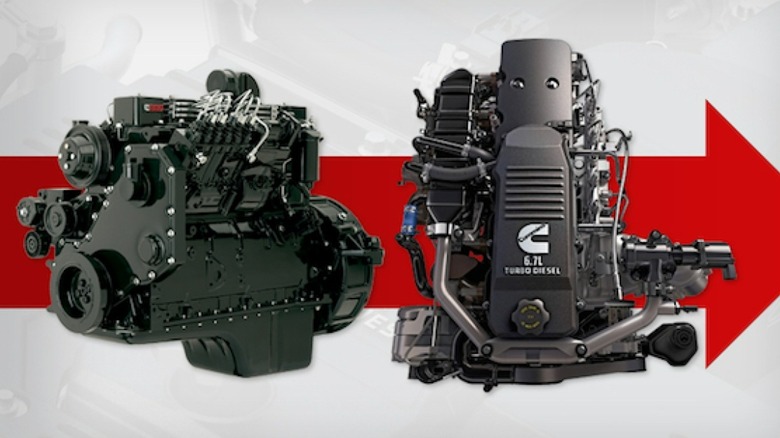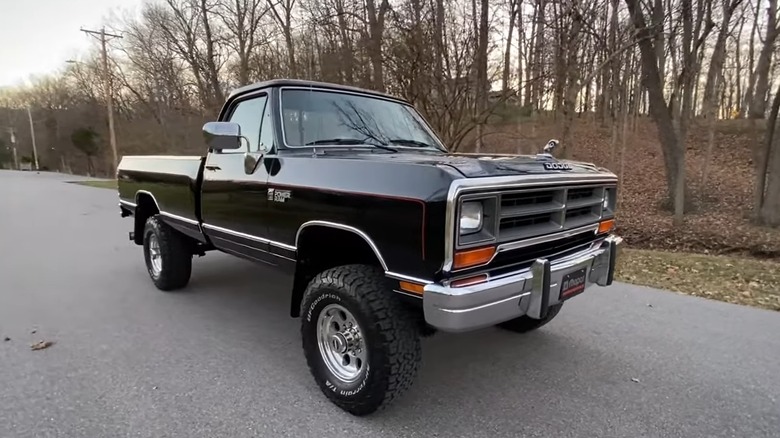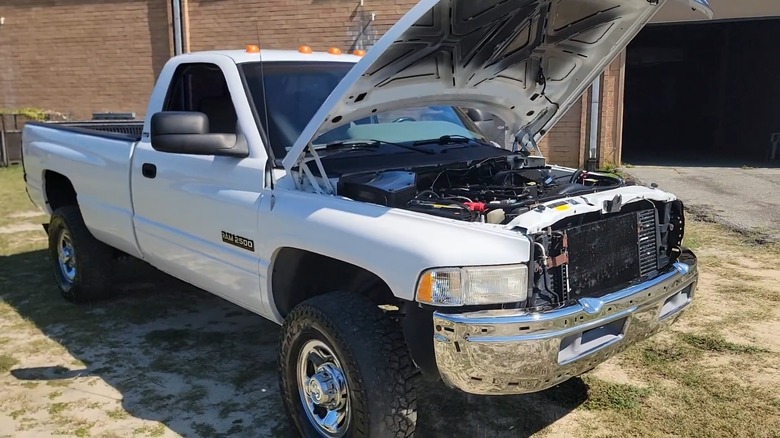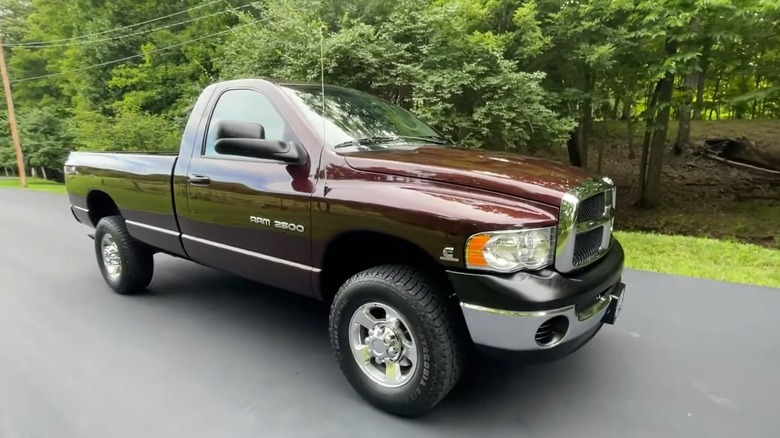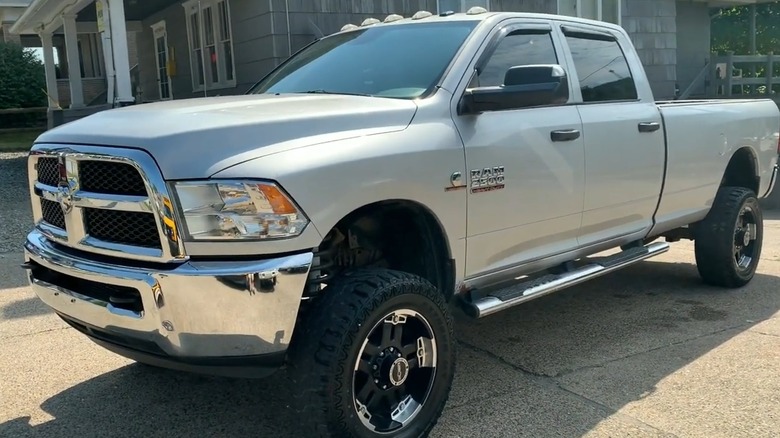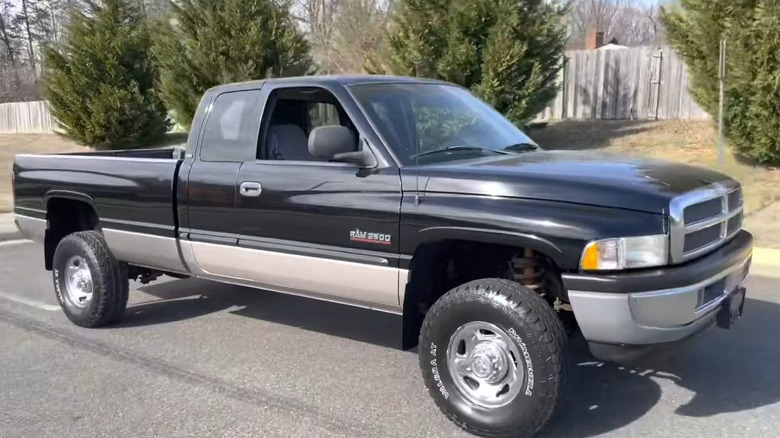Fans Say These Are The 5 Best Years For Cummins Diesel Engines
The Cummins six-cylinder diesel engine is a remarkable feat of engineering and one of the most reliable diesel motors ever built. These legendary engines have powered the Dodge and Ram diesel pickup truck line since 1989. In the years since, the motors, as well as the Cummins name, have developed a reputation for robust power, intense reliability, and long-lasting performance. The Cummins brand has a devoted fanbase, and in the never-ending debate about which truck brand is best, Cummins and Dodge fans always make themselves heard.
One of the primary characteristics that sets Cummins' Dodge and Ram motors apart from other non-commercial diesel pickup engines is the fact that they only have six cylinders. While most manufacturers outfit their diesel truck lineups with powerful V8 motors, Dodge decided to go a different route. The company's decision in 1989 to install an in-line six-cylinder diesel engine into its heavy-duty pickup line would turn out to be legendary. Not only does the six-cylinder engine generate respectable amounts of horsepower and downright massive amounts of torque, but it also gets better fuel mileage than most large pickups, thanks, in no small part, to its six-cylinder construction.
All of that said, not all Cummins diesel engines are equal. The 5.0-liter Cummins found in the Nissan Titan, for example, is notorious for performance issues and mechanical failures. While Dodge/Ram Cummins engines have a much more solid reputation than their Nissan counterparts, they also aren't immune to issues. Across all five Cummins generations, some model years are definitely better than others. What are they? Let's dive in and check out which years fans and experts say are the best for Cummins diesel engines.
First-generation 5.9-liter 12-valve (1989 - 1993)
They say you never forget your first, and for many Cummins fans and enthusiasts, that couldn't be more true. The first-generation Cummins engine was built into Dodge's D250 and D350 pickup trucks. These early engines had displacements of 5.9 liters with 12 valves, meaning one exhaust and one intake valve per cylinder. In contrast to Ford and GM's diesel trucks of the time, the Dodge pickups came stock with a turbocharger and direct fuel injection, allowing them to stand out from the competition and provide increased performance.
These first-gen trucks didn't produce a crazy amount of horsepower — roughly 160 horses made it to the wheels — but they did provide a mind-boggling 400 lb ft of torque, more than any other competitor at this time. The trucks were available with either an automatic or manual transmission, and they were built in Dodge's, admittedly outdated by that point, boxy, square style. These days, fans celebrate the first-generation Dodge Cummins pickups for their engines, classic looks, and upgradeability. The first-gen 12-valves are easy to work on and make excellent blank canvases for modifications. Finally, as with many older vehicles, the first-gen Cummins motors lack modern emissions control systems, making them significantly more reliable than many successors.
Second-generation 5.9-liter 12-valve (1994 - 1998)
In 1994, Dodge released the second generation of its Cummins-powered diesel pickup trucks. Many fans consider this generation to be one of the best, if not the absolute best, Cummins engine ever built. The second-gen engine kept its original 5.9-liter displacement and 12-valve construction — for a period of time, that is. However, the pickup also got some updates, including a more modern body style reminiscent of commercial semi-trucks and the addition of one of the most famous Cummins parts ever: the P-pump. The Bosch P7100 fuel pump is known to be highly reliable and long-lasting, and it provided several upgrades when compared to the previous generation's pump that contributed to improved combustion. Its simple construction allows users to rebuild and modify it, making the P-pump highly popular with tuners and hot-rodders.
Second-gen 12-valves are widely considered some of the best Cummins engines in existence, especially for drivers who value simplicity and upgradeability. Power outputs also increased for the second-gen 12-valves. While horsepower levels only saw a marginal increase, torque outputs continued to rise, and the engines' reputation for reliable and robust performance grew. In the second half of 1998, however, Dodge phased out the 12-valve 5.9 and replaced it with a 24-valve version. The new motor would continue Cummins' legacy of durable, long-lasting performance, but it faced a few issues along the way.
Late second-generation and third-generation 5.9-liter 24-valve (2002 - 2007)
Midway through the second-generation Cummins' production timeline, Dodge phased out the 12-valve and replaced it with a 24-valve version. While the engine's 5.9-liter displacement remained the same, Dodge added many upgrades to the new version of the legendary motor. The first few years of the 24-valve's production were rocky, thanks to a less-reliable fuel pump and manufacturer's defects in some of the early engines' blocks. However, Dodge addressed the faulty block issue quickly, replacing many of the affected motors under warranty. The fuel pump remained, and many fans and enthusiasts recommend replacing it with an aftermarket version.
Outside of those early issues, the 24-valve became a hit in the world of gearheads and diesel lovers. Many consider the 2002 model to be one of the best Cummins engines ever, thanks to its four-way disc brakes and lack of contemporary emissions control devices, while others consider the later third-generation models to be superior due to their higher power outputs and more modern interior features. Overall, both the late second-gen and the third-gen 24-valve Cummins engines are considered to be excellent and reliable pickups. Both generations are easy to modify and produce high torque outputs with long-lasting, durable performance.
Mid fourth-generation 6.7-liter 24-valve (2007 - 2015)
In 2007, Dodge changed the Cummins 24-valve engine in a radical way. By dramatically increasing the six pistons' bore and stroke, the company was able to increase the engine's displacement by nearly an entire liter. The resulting 6.7-liter engine produced significantly higher levels of horsepower and torque, catapulting the engine and Dodge's line of 2500 and 3500 pickup trucks to a new level of power and driveability.
While the very first and the later fourth-gen 6.7 engines suffered from a series of issues, the mid-generation 6.7 motors were robust and reliable. One of the best things about these engines is that Dodge/Ram produced its diesel pickups with an optional manual transmission until 2018. Between 2011 and 2018, Ram was the only manufacturer to offer a diesel pickup with a manual transmission. That may seem insignificant to many casual drivers, but manual transmissions provide a lot of benefits, especially when towing a heavy load or driving off-road. Many enthusiasts search specifically for 6.7 engines from this time period in hopes of finding one with a manual transmission, and fans frequently cite the mid-fourth-gen Cummins engines as some of the best ever built.
What about the worst years?
We've already covered a large chunk of Cummins' six-cylinder diesel engine production history. Based on that, you may be wondering if there are any years you should avoid. The answer is yes. Due to a series of issues, fans and experts widely recommend staying away from a few Cummins years.
While the first two generations of Cummins diesel engines aren't super powerful in modern terms, they have a massive amount of potential and are unhindered by contemporary emissions controls. Because of that, we don't encounter our first really problematic model years until the tail-end of the second generation's production timeline. Some of the very first 24-valve engines, produced between the second half of 1998 and 2001, featured the notorious "53" block. Thanks to a manufacturer's flaw, these blocks were exceptionally weak and known to crack. Dodge replaced many of those engines under warranty at the time. However, these pickups are now too old for the warranty to apply, and most experts recommend avoiding these years.
The early and late fourth-generation 6.7-liter engines are also considered to be some of the more problematic Cummins motors. While drivers report experiencing a few emissions issues with their early fourth-gen pickups, the late fourth-generation trucks faced a series of problems, including suspension issues, airbag malfunctions, and electrical failures.
While the newest Ram pickups are incredibly powerful, they haven't been on the market long enough to know whether they'll produce any severe problems, and some drivers have reported experiencing a few minor issues with the most recent fifth-generation 6.7 motors. If you're searching for a quality pickup with a Cummins six-cylinder engine, you have many options, but for now, you're probably better off sticking with one of the various tried-and-true years covered here.
